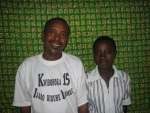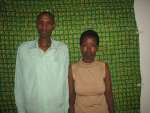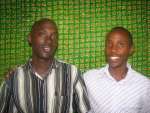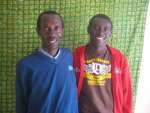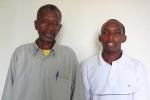Sakindi Jean Marie Vianney & Sakindi Uwera Marie Rose
Sakindi Jean Marie Vianney and his daughter Sakindi Uwera Marie Rose use this opportunity to discuss the origins and causes of the 1994 genocide on both personal and national levels. Sakindi Jean Marie describes to Sakindi Uwera Marie Rose how close he and his wife came to death and what life was like in the years leading up to the genocide. They hid in closets, relied on the kindness of their neighbors, and turned to faith to keep them hopeful and lead them to forgiveness. Sakindi Uwera Marie Rose details how she and her classmates try to prevent conflict in their country.
Kayiranga Celestin & Mukasine Dafrose
At Mukasine Dafrose's request, Kayiranga Celestin recounts the story of Rwabugiri and Rwanyonga. The story of a king and his highest confidant and the jealousy and hostility between them. The events that transpire during a hunting trip, a contest, and a wedding, communicate to Mukasine Dafrose that heroism comes in many forms and allows her to compare modern life with the ways of the past. Kayiranga Celestin uses this folk tale to encourage Mukasine Dafrose to be heroic in her daily life by living in harmony and being hospitable to those in need.
Niyiguba Emmanuel & Rugira Jean Rene
Older brother Niyiguba Emmanuel explains in great detail the genocide that resulted in the brothers' loss of several siblings and one parent. Rugira Jean Rene recounts to his brother the details of the genocide and ethnic discrimination that he is familiar with and Niyiguba Emmanuel elaborates on these facts with more details and additional information, helping his younger brother to understand his country's and family's history better.
Mwumvaneza Vincent & Tambo Nelson
Tambo Nelson and his older brother Mwumvaneza Vincent discuss the colonial origins of the ethnic divide between Hutu and Tutsi. Mwumvaneza Vincent explains how, prior to colonialism, Rwanda was divided by wealth and status, not ethnicity, but the presence of colonial settlers and their institutions codified these differences and lead to ethnically divided political parties. Mwumvaneza Vincent wants Tambo Nelson to understand how violence and "genocide ideology" became present in Rwanda as a result of ethnic discrimination in education, work opportunities, and political rights.
Bisangwa Simon & Kubwimana Jean d'Amour
Kubwimana Jean d’Amour would rather listen to history from his father than read it in a history book “written by Frenchmen.” In this interview, he listens to Bisangwa Simon’s personal history for the first time, an experience that both men find beneficial. Bisangwa Simon has had a chaotic life; a high school dropout, he lived through several wars, overcame addiction to alcohol and drugs, and survived a curse. He tells his son how their family survived the genocide by supporting each other in hiding.
Gahongaire Emelda & Manirakiza Jean de Dieu
Gahongaire Emelda decided to become a pastor after witnessing the love for God that her grandfather had. After the genocide, she decided to serve God by helping orphans, and she adopted Manirakiza Jean de Dieu, who she considers to be her own son. Manirakiza Jean de Dieu has many important questions about the causes of the genocide, and Gahongaire Emelda patiently answers him and gives him advice. She tells him that the most important thing is to love God and fight against anything that could lead to genocide again.
Kajuga Augustin & Nkurikiyimana Ignace
Kajuga Augustin, born in 1939, has much to tell Nkurikiyimana Ignace about Rwanda before colonialism: the history of kings and how power was transferred from one to another, how young people were treated differently by their mothers versus their fathers, and how they were joined in marriage. He recounts how some practices are thankfully outdated, like drowning unmarried, pregnant women, while some celebrate values that are still positive, such as respect and cooperation.


